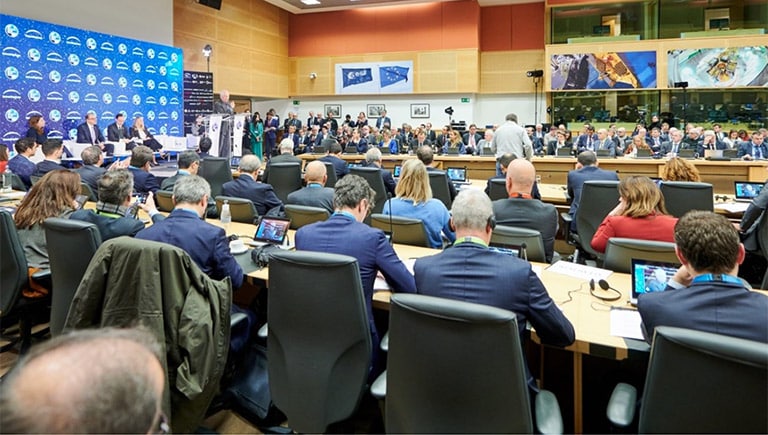The ever-growing link between space and defence
By Tomas Dimitrov, Director logos.BBE and Julien Bocquet Business, Defence, Space and Aviation, logos.BBE
In fact, in 2007, it did not prevent China from successfully destroying an old meteorological satellite with a ballistic missile, and India followed suit shortly. In November 2021, a Russian ASAT test resulted in a field of some 1,500 pieces of debris posing substantial risks to the ISS and space assets.
Given the cheaper access to space, space assets multiplied. In turn, the necessity for securing those aspects became more paramount, especially considering the vast array of threats in space (e.g. kinetic (ASATs) and non-kinetic (signal jamming, cyber-attacks).
Against this backdrop, NATO and the EU have identified space as an operational and strategic domain, respectively.
Ensuring Europe’s security with credible deterrence in space and on Earth
Space civilian programmes have been established at the European level for several decades. Today, the EU Space Programme embodies a clear cooperation framework between the European Union and the European Space Agency. It oversees three main space flagships, Copernicus for world-class Earth Observation; Galileo, the EU’s global navigation satellite system; and EGNOS, a satellite-based augmentation system that improves navigation signals to support aviation, maritime and land users.
The EU Space Programme includes certain security aspects, such as Galileo PRS (an encrypted navigation service), but it never ventured into the defence realm per se. Not only because defence remains a Member State competence but also because all the EU flagships were developed during peaceful times on the Old Continent.
Despite these limitations, several steps have been taken towards further cross-fertilisation. For instance, the Action Plan on synergies between civil, defence and space industries provided ways to improve and maximise support to dual-use innovation. Also, the European Defence Fund includes funding and projects dedicated to space. The new EU flagship spearheaded by Commissioner Breton for space-based secure communications, IRIS2, will be built following a dual-use by design approach to include governmental security requirements from the outset.
However, considering that space assets and services are crucial enablers of our daily lives and enablers of Europe’s security and defence, this is not enough. These assets must be protected and defended, and their use must be leveraged for security and defence purposes – even more so when war is at Europe’s doorstep.
EU’s High Representative for Foreign Affairs and Security Policy, Josep Borrell, has also formalised this intention during Business Bridge Europe’s 15th European Space Conference. He stressed that space will become a “kind of battlefield: at least, a place where competition and confrontation will take place”. Commissioner Breton echoed these words affirming the “need to become a more assertive space power”. On this occasion, they both outlined the soon-to-be-published EU Space Strategy for Security and Defence.
To meet the high expectations of the Strategy, it is crucial that the EU, and its Member States, adopt a pragmatic approach vis-à-vis the defence dimension of space. An eventual regulatory framework should be coupled with the necessary investments into tools and means ensuring proper deterrence. Providing European autonomous access to space and achieving technological sovereignty will be the nerve of the ongoing space race. Resorting to technologies such as multi-orbital systems, in-orbit servicing, and self-protection of satellites could already be a good step forward for the EU.
Moreover, the space dimension of the European defence industry policy should not be overlooked either. The European Commission, the European External Action Service and the European Defence Agency should further leverage synergies and ensure alignment of the EU and Member State investment programmes.
“Providing European autonomous access to space and achieving technological sovereignty will be the nerve of the ongoing space race.”
Beyond a shadow of a doubt, 2023 will be an important year for space and defence. In the EU, ambitious initiatives aim to secure the Union’s future in space and on Earth. However, to ensure a peaceful use of space, it is up to the international community to make reasonable and firm diplomatic efforts, setting international rules through concrete steps.
—
Do you want to keep up with the latest defence, space and aviation related developments in the EU and beyond? Logos has an experienced team to give the latest insights so you don’t miss a thing.

